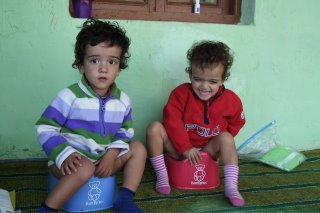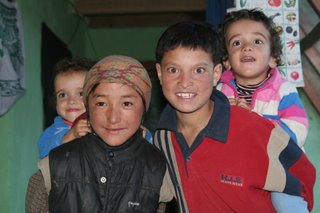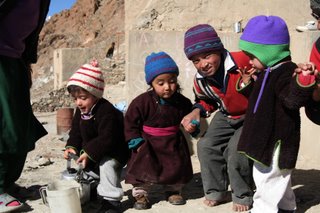
Warning: this post has offensive language and images. Not for the squeamish, unless you have potty trained a child...
There are a few drawbacks to starting potty training on a cliff in a desert, where the water supply is spotty at best. On good days, the water came to the cliff via a 1 inch diameter black rubber pipe, for an hour or two or less. That is whenever the Nepali laborers who were "fixing" or "improving" the water supply had not accidentally or intentionally disconnected the pipe or rerouted it for their construction purposes. There is a certain haste and intensity to these projects as they can only happen between May and October in Zangskar, before the Nepali workers leave and the streams freeze up. Given that everyone is fighting over the same water, for a range of uses, during a very short work season, you can begin to imagine the subtle, but always Buddhist, tensions in water sharing.
Back to potty training. The cloth diapers and rags, as well as dishes, pots, and pans would pile up through the day as we did other things like fetch the water from the pipe. Often there would be a pile of soiled diapers outside our door under a rock, so that the stray dogs would not get at them. In Zangskar, many stray dogs eat shit, as food is scarce. Even if, like our strays, they live near a nunnery or monastery where kind nuns or monks are constantly setting aside ritual dough figurines or throwing out leftovers, the dogs are still hungry.
On not so good days, when Tashi and Krishan had diarrhea or had decided to poop OUTSIDE not inside the potty, things got a bit more complex. Suddenly, we were playing the game of "where is that poop". In other words trying to find the places that Tashi and Krishan had been after or during their poop. It was highly likely there was poop spread on all kinds of other surfaces including, but not limited to clothes, hands, rugs, walls, etc. We had dirt floors and it isn't easy to clean poop off dirt floors. All of this required more and more water. You begin to see the crux of our problem. Sometimes there was a toss-up between whether to clean the floor, or do the dishes, or cook up a meal. Or at least decide which took priority.
I had a huge burst of compassion and insight into the lives of rural women in India, whose children often get diarrhea, even as they struggle to keep their kids and houses clean. I've read some public health literature pertaining to the problem of diarrhea, which continues to be one of THE MAJOR causes of infant mortality in India and other parts of the 'developing' world. Some people may rant that this problem is entirely preventable if more people (they usually mean women who are taking care of most infants) had ready access to clean water, public hygene awareness, and literacy.
I would like to note that our household had all these things and we were still unable to prevent at least one member of our household from getting diarrhea once a week. Our household was entirely literate, AND aware of basic hygene methods (excepting Tashi and Krishan), AND, we had fairly ready access to mostly clean water. Ok, there was the odd fact that everybody in the village was suffering from dysentery and we all used the same collection tank upstream of the village. But the water in that tank was clean enough, or as clean as its going to get in rural Zangskar for a very long time. In the meantime, Tashi got sick pretty much every week, Krishan every fortnight. Mom and Pop were sick only once a month, mercifully.
I have a huge amount of respect and appreciation for what many mothers in India are up against. They may be trying to keep track of two or three kids, with a limited water source that may be an hour's walk away or rationed due to scarcity (as in urban India where water may arrive by truck but be strictly rationed by household). Furthermore, the actual water kept in the household is limited by the size and number of storage containers available. One tends to forget that if you don't have running water, every drop brough to the house has to be stored, preferably in a clean pot. You should have seen the frantic filling of pots and other containers wheneverthe water pipe was functioning. Ashok once joked that the arrival of water seemed on par with the arrival of the Dalai Lama in Karsha. He was worried about what might happen if the Dalai Lama and the water showed up on the same day??
So, I now understand a lot more about how impossibly hard it is to keep infants (or adults) free of dysentery in rural India.
 Ani Skalzang Lhamo, my first roomate at Karsha nunnery. An amazingly patient woman, she is a far better parent than either I or Ashok. But she is committed to lifelong celibacy, and so she's not planning on having kids, in this lifetime at least or the next, when she's hoping to be reborn as a monk.
Ani Skalzang Lhamo, my first roomate at Karsha nunnery. An amazingly patient woman, she is a far better parent than either I or Ashok. But she is committed to lifelong celibacy, and so she's not planning on having kids, in this lifetime at least or the next, when she's hoping to be reborn as a monk. 




